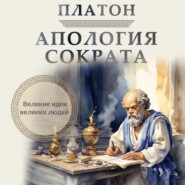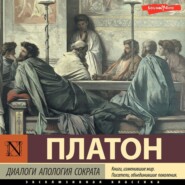По всем вопросам обращайтесь на: info@litportal.ru
(©) 2003-2024.
✖
Symposium
Настройки чтения
Размер шрифта
Высота строк
Поля
(Compare Hoeck's Creta and the admirable and exhaustive article of Meier in Ersch and Grueber's Cyclopedia on this subject; Plutarch, Amatores; Athenaeus; Lysias contra Simonem; Aesch. c. Timarchum.)
The character of Alcibiades in the Symposium is hardly less remarkable than that of Socrates, and agrees with the picture given of him in the first of the two Dialogues which are called by his name, and also with the slight sketch of him in the Protagoras. He is the impersonation of lawlessness – 'the lion's whelp, who ought not to be reared in the city,' yet not without a certain generosity which gained the hearts of men, – strangely fascinated by Socrates, and possessed of a genius which might have been either the destruction or salvation of Athens. The dramatic interest of the character is heightened by the recollection of his after history. He seems to have been present to the mind of Plato in the description of the democratic man of the Republic (compare also Alcibiades 1).
There is no criterion of the date of the Symposium, except that which is furnished by the allusion to the division of Arcadia after the destruction of Mantinea. This took place in the year B.C. 384, which is the forty-fourth year of Plato's life. The Symposium cannot therefore be regarded as a youthful work. As Mantinea was restored in the year 369, the composition of the Dialogue will probably fall between 384 and 369. Whether the recollection of the event is more likely to have been renewed at the destruction or restoration of the city, rather than at some intermediate period, is a consideration not worth raising.
The Symposium is connected with the Phaedrus both in style and subject; they are the only Dialogues of Plato in which the theme of love is discussed at length. In both of them philosophy is regarded as a sort of enthusiasm or madness; Socrates is himself 'a prophet new inspired' with Bacchanalian revelry, which, like his philosophy, he characteristically pretends to have derived not from himself but from others. The Phaedo also presents some points of comparison with the Symposium. For there, too, philosophy might be described as 'dying for love;' and there are not wanting many touches of humour and fancy, which remind us of the Symposium. But while the Phaedo and Phaedrus look backwards and forwards to past and future states of existence, in the Symposium there is no break between this world and another; and we rise from one to the other by a regular series of steps or stages, proceeding from the particulars of sense to the universal of reason, and from one universal to many, which are finally reunited in a single science (compare Rep.). At first immortality means only the succession of existences; even knowledge comes and goes. Then follows, in the language of the mysteries, a higher and a higher degree of initiation; at last we arrive at the perfect vision of beauty, not relative or changing, but eternal and absolute; not bounded by this world, or in or out of this world, but an aspect of the divine, extending over all things, and having no limit of space or time: this is the highest knowledge of which the human mind is capable. Plato does not go on to ask whether the individual is absorbed in the sea of light and beauty or retains his personality. Enough for him to have attained the true beauty or good, without enquiring precisely into the relation in which human beings stood to it. That the soul has such a reach of thought, and is capable of partaking of the eternal nature, seems to imply that she too is eternal (compare Phaedrus). But Plato does not distinguish the eternal in man from the eternal in the world or in God. He is willing to rest in the contemplation of the idea, which to him is the cause of all things (Rep.), and has no strength to go further.
The Symposium of Xenophon, in which Socrates describes himself as a pander, and also discourses of the difference between sensual and sentimental love, likewise offers several interesting points of comparison. But the suspicion which hangs over other writings of Xenophon, and the numerous minute references to the Phaedrus and Symposium, as well as to some of the other writings of Plato, throw a doubt on the genuineness of the work. The Symposium of Xenophon, if written by him at all, would certainly show that he wrote against Plato, and was acquainted with his works. Of this hostility there is no trace in the Memorabilia. Such a rivalry is more characteristic of an imitator than of an original writer. The (so-called) Symposium of Xenophon may therefore have no more title to be regarded as genuine than the confessedly spurious Apology.
There are no means of determining the relative order in time of the Phaedrus, Symposium, Phaedo. The order which has been adopted in this translation rests on no other principle than the desire to bring together in a series the memorials of the life of Socrates.
PERSONS OF THE DIALOGUE: Apollodorus, who repeats to his companion the dialogue which he had heard from Aristodemus, and had already once narrated to Glaucon. Phaedrus, Pausanias, Eryximachus, Aristophanes, Agathon, Socrates, Alcibiades, A Troop of Revellers.
SCENE: The House of Agathon.
Concerning the things about which you ask to be informed I believe that I am not ill-prepared with an answer. For the day before yesterday I was coming from my own home at Phalerum to the city, and one of my acquaintance, who had caught a sight of me from behind, calling out playfully in the distance, said: Apollodorus, O thou Phalerian (Probably a play of words on (Greek), 'bald-headed.') man, halt! So I did as I was bid; and then he said, I was looking for you, Apollodorus, only just now, that I might ask you about the speeches in praise of love, which were delivered by Socrates, Alcibiades, and others, at Agathon's supper. Phoenix, the son of Philip, told another person who told me of them; his narrative was very indistinct, but he said that you knew, and I wish that you would give me an account of them. Who, if not you, should be the reporter of the words of your friend? And first tell me, he said, were you present at this meeting?
Your informant, Glaucon, I said, must have been very indistinct indeed, if you imagine that the occasion was recent; or that I could have been of the party.
Why, yes, he replied, I thought so.
Impossible: I said. Are you ignorant that for many years Agathon has not resided at Athens; and not three have elapsed since I became acquainted with Socrates, and have made it my daily business to know all that he says and does. There was a time when I was running about the world, fancying myself to be well employed, but I was really a most wretched being, no better than you are now. I thought that I ought to do anything rather than be a philosopher.
Well, he said, jesting apart, tell me when the meeting occurred.
In our boyhood, I replied, when Agathon won the prize with his first tragedy, on the day after that on which he and his chorus offered the sacrifice of victory.
Then it must have been a long while ago, he said; and who told you – did Socrates?
No indeed, I replied, but the same person who told Phoenix; – he was a little fellow, who never wore any shoes, Aristodemus, of the deme of Cydathenaeum. He had been at Agathon's feast; and I think that in those days there was no one who was a more devoted admirer of Socrates. Moreover, I have asked Socrates about the truth of some parts of his narrative, and he confirmed them. Then, said Glaucon, let us have the tale over again; is not the road to Athens just made for conversation? And so we walked, and talked of the discourses on love; and therefore, as I said at first, I am not ill-prepared to comply with your request, and will have another rehearsal of them if you like. For to speak or to hear others speak of philosophy always gives me the greatest pleasure, to say nothing of the profit. But when I hear another strain, especially that of you rich men and traders, such conversation displeases me; and I pity you who are my companions, because you think that you are doing something when in reality you are doing nothing. And I dare say that you pity me in return, whom you regard as an unhappy creature, and very probably you are right. But I certainly know of you what you only think of me – there is the difference.
COMPANION: I see, Apollodorus, that you are just the same – always speaking evil of yourself, and of others; and I do believe that you pity all mankind, with the exception of Socrates, yourself first of all, true in this to your old name, which, however deserved, I know not how you acquired, of Apollodorus the madman; for you are always raging against yourself and everybody but Socrates.
APOLLODORUS: Yes, friend, and the reason why I am said to be mad, and out of my wits, is just because I have these notions of myself and you; no other evidence is required.
COMPANION: No more of that, Apollodorus; but let me renew my request that you would repeat the conversation.
APOLLODORUS: Well, the tale of love was on this wise: – But perhaps I had better begin at the beginning, and endeavour to give you the exact words of Aristodemus:
He said that he met Socrates fresh from the bath and sandalled; and as the sight of the sandals was unusual, he asked him whither he was going that he had been converted into such a beau: —
To a banquet at Agathon's, he replied, whose invitation to his sacrifice of victory I refused yesterday, fearing a crowd, but promising that I would come to-day instead; and so I have put on my finery, because he is such a fine man. What say you to going with me unasked?
I will do as you bid me, I replied.
Follow then, he said, and let us demolish the proverb: —
'To the feasts of inferior men the good unbidden go;'
instead of which our proverb will run: —
'To the feasts of the good the good unbidden go;'
and this alteration may be supported by the authority of Homer himself, who not only demolishes but literally outrages the proverb. For, after picturing Agamemnon as the most valiant of men, he makes Menelaus, who is but a fainthearted warrior, come unbidden (Iliad) to the banquet of Agamemnon, who is feasting and offering sacrifices, not the better to the worse, but the worse to the better.
I rather fear, Socrates, said Aristodemus, lest this may still be my case; and that, like Menelaus in Homer, I shall be the inferior person, who
'To the feasts of the wise unbidden goes.'
But I shall say that I was bidden of you, and then you will have to make an excuse.
'Two going together,'
he replied, in Homeric fashion, one or other of them may invent an excuse by the way (Iliad).
This was the style of their conversation as they went along. Socrates dropped behind in a fit of abstraction, and desired Aristodemus, who was waiting, to go on before him. When he reached the house of Agathon he found the doors wide open, and a comical thing happened. A servant coming out met him, and led him at once into the banqueting-hall in which the guests were reclining, for the banquet was about to begin. Welcome, Aristodemus, said Agathon, as soon as he appeared – you are just in time to sup with us; if you come on any other matter put it off, and make one of us, as I was looking for you yesterday and meant to have asked you, if I could have found you. But what have you done with Socrates?
I turned round, but Socrates was nowhere to be seen; and I had to explain that he had been with me a moment before, and that I came by his invitation to the supper.
You were quite right in coming, said Agathon; but where is he himself?
He was behind me just now, as I entered, he said, and I cannot think what has become of him.
Go and look for him, boy, said Agathon, and bring him in; and do you, Aristodemus, meanwhile take the place by Eryximachus.
The servant then assisted him to wash, and he lay down, and presently another servant came in and reported that our friend Socrates had retired into the portico of the neighbouring house. 'There he is fixed,' said he, 'and when I call to him he will not stir.'
How strange, said Agathon; then you must call him again, and keep calling him.
Let him alone, said my informant; he has a way of stopping anywhere and losing himself without any reason. I believe that he will soon appear; do not therefore disturb him.
Well, if you think so, I will leave him, said Agathon. And then, turning to the servants, he added, 'Let us have supper without waiting for him. Serve up whatever you please, for there is no one to give you orders; hitherto I have never left you to yourselves. But on this occasion imagine that you are our hosts, and that I and the company are your guests; treat us well, and then we shall commend you.' After this, supper was served, but still no Socrates; and during the meal Agathon several times expressed a wish to send for him, but Aristodemus objected; and at last when the feast was about half over – for the fit, as usual, was not of long duration – Socrates entered. Agathon, who was reclining alone at the end of the table, begged that he would take the place next to him; that 'I may touch you,' he said, 'and have the benefit of that wise thought which came into your mind in the portico, and is now in your possession; for I am certain that you would not have come away until you had found what you sought.'
How I wish, said Socrates, taking his place as he was desired, that wisdom could be infused by touch, out of the fuller into the emptier man, as water runs through wool out of a fuller cup into an emptier one; if that were so, how greatly should I value the privilege of reclining at your side! For you would have filled me full with a stream of wisdom plenteous and fair; whereas my own is of a very mean and questionable sort, no better than a dream. But yours is bright and full of promise, and was manifested forth in all the splendour of youth the day before yesterday, in the presence of more than thirty thousand Hellenes.
You are mocking, Socrates, said Agathon, and ere long you and I will have to determine who bears off the palm of wisdom – of this Dionysus shall be the judge; but at present you are better occupied with supper.
Socrates took his place on the couch, and supped with the rest; and then libations were offered, and after a hymn had been sung to the god, and there had been the usual ceremonies, they were about to commence drinking, when Pausanias said, And now, my friends, how can we drink with least injury to ourselves? I can assure you that I feel severely the effect of yesterday's potations, and must have time to recover; and I suspect that most of you are in the same predicament, for you were of the party yesterday. Consider then: How can the drinking be made easiest?
I entirely agree, said Aristophanes, that we should, by all means, avoid hard drinking, for I was myself one of those who were yesterday drowned in drink.
I think that you are right, said Eryximachus, the son of Acumenus; but I should still like to hear one other person speak: Is Agathon able to drink hard?
I am not equal to it, said Agathon.
Then, said Eryximachus, the weak heads like myself, Aristodemus, Phaedrus, and others who never can drink, are fortunate in finding that the stronger ones are not in a drinking mood. (I do not include Socrates, who is able either to drink or to abstain, and will not mind, whichever we do.) Well, as of none of the company seem disposed to drink much, I may be forgiven for saying, as a physician, that drinking deep is a bad practice, which I never follow, if I can help, and certainly do not recommend to another, least of all to any one who still feels the effects of yesterday's carouse.
I always do what you advise, and especially what you prescribe as a physician, rejoined Phaedrus the Myrrhinusian, and the rest of the company, if they are wise, will do the same.

















